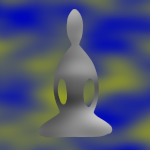Dear Friends,
The first factor is called right (or wise) view, sometimes also called wise understanding.
A note about the word “right” in these descriptions: it’s not a moralistic “I’m right and you’re wrong” attitude, but one of “what’s appropriate in this context”. If want to put a nail in a piece of wood, then the right tool could be a hammer, as opposed to a screwdriver.
We can have many perspectives to view our life – to help us navigate work and family and to live society. Gil says, “in order to walk the Buddhist path to freedom, Right View is an essential ingredient. It is the perspective needed to find the path in the first place. It points us to what we are doing when we suffer and to how to stop doing this. Part of the value of this perspective is its pragmatic simplicity. It does not rely on any supernatural or mystical beliefs. We are not asked to believe or depend on something we cannot know directly for our self, in our self.”
(Introduction to the Eightfold Path, page 3.)
Right view itself has a couple of perspectives. One is to realize that what we do, say, and think has consequences. Through our practice, we can pay more attention to this aspect, and that may help us be more considerate with the way we are in the world. We can incline to doing that which is more helpful and less harmful.
The other perspective is to understand the four noble truths. I like the way Sylvia Boorstein describes these:
I. Life is challenging. For everyone. Our physical bodies, our relationships — all of our life circumstances — are fragile and subject to change. We are always accommodating.
“The Buddha’s Four Noble Truths” Lions Roar, July 30, 2018.
II. The cause of suffering is the mind’s struggle in response to challenge.
III. The end of suffering — a non-struggling, peaceful mind — is a possibility.
IV. The program for ending suffering is the Eightfold Path.
https://www.lionsroar.com/pay-attention-for-goodness-sake/
When we understand that life has its difficulties, and yet there is a way to meet that challenge with less struggle, that can motivate us to take on and continue with this practice!
What motivated you to be on this path of practice?
With good wishes,
Andrea
